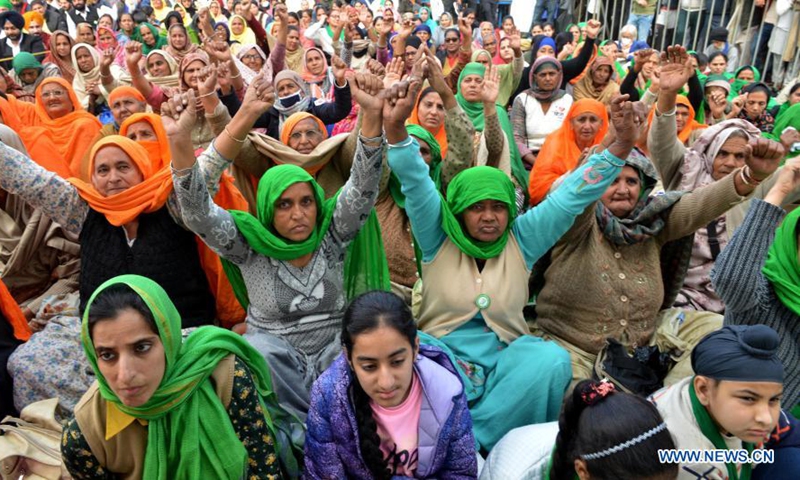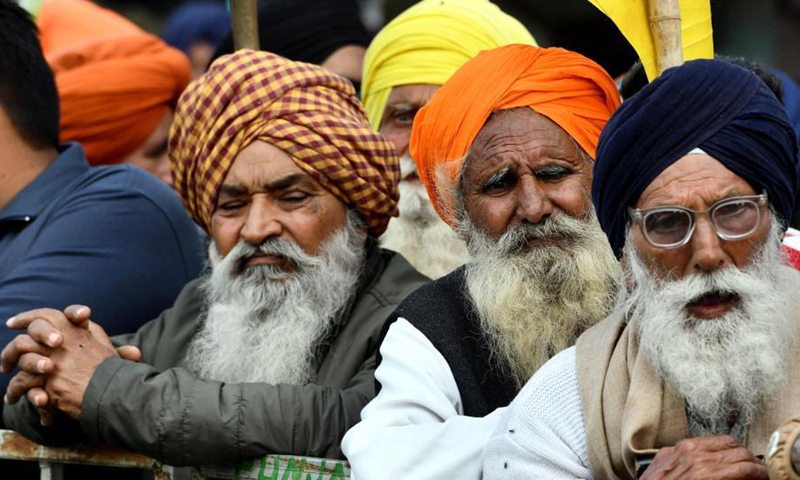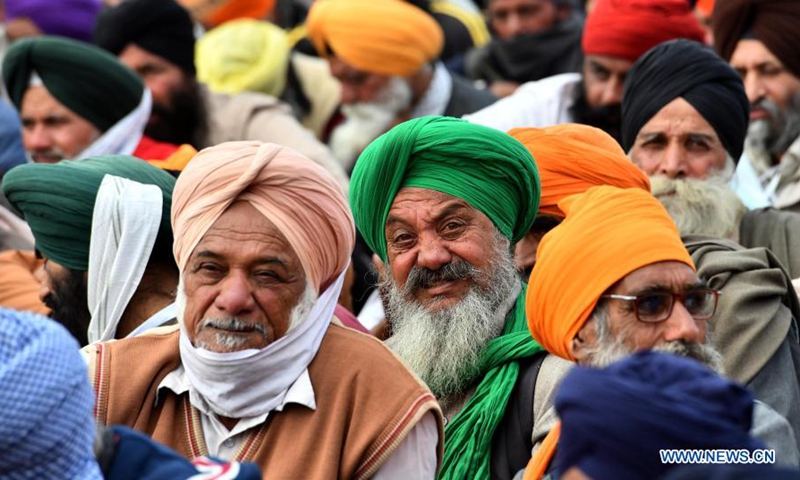Farmers' strike shows no signs of waning in India
Source: Xinhua Published: 2020/12/14 13:27:51

Indian farmers participate in a protest against new farm laws at the border between New Delhi and Haryana State in India, Dec. 13, 2020. (Photo by Partha Sarkar/Xinhua)
The ongoing strike of farmers in India shows no sign of waning.
Sunday marks the eighteenth-straight day of the protests against the three contentious farm laws passed recently by the Indian government.
Thousands of farmers who are up in arms against the three laws are peacefully camping in and outside India's national capital of New Delhi, demanding immediate unconditional revocation of the laws which they say are against their interests.
The farmers have been on roads in the cold weather trying to build pressure on the government to redress their grievances.
On Sunday afternoon authorities closed Delhi-Jaipur highway after agitating farmers began a tractor march from Shahjahanpur on the Rajasthan-Haryana border. The farmers planned to join thousands of others who are already staging the protest.

Indian farmers participate in a protest against new farm laws at the border between New Delhi and Haryana State in India, Dec. 13, 2020. (Photo by Partha Sarkar/Xinhua)
The protesting farmers carrying placards were shouting slogans as they walked slowly down the highway. The march was led by Swaraj India chief Yogendra Yadav and social activist Medha Patkar.
While protesting farmers argue the laws would endanger their livelihoods, the government defends the new legislation would reform the agriculture sector.
With both sides maintaining the tough posture and unwilling to budge, talks so far have failed to bring desired results.
The protests began last month on Nov. 26 after farmers embarked on the protest call of "Delhi Chalo (move to Delhi) from Punjab". The call was given by farmer associations. The farmers had to struggle with the heavy policemen deployments in Haryana to reach the Delhi border, where again they had to face police barricades, baton charging, tear smoke and water cannons. Even roads were dug at some places to stop the farmers.
The defiant farmers stood the ground and since then have been on the protest. As they are carrying essentials with them they are cooking their own food, an indication that protests can prolong.
On Saturday, Indian Prime Minister Narendra Modi, who has staunchly defended the farm laws, made another appeal to the farmers saying his government's initiatives would "increase farmers' income and make them more prosperous.
"These reforms will give farmers new markets, advantages of technology, and help bring investments. It is my country's farmers who will benefit the most from all this," Modi said.
The farmers, however, are demanding the complete repeal of the controversial laws.
"If the government wants to hold talks, we are ready, but our main demand will remain the scrapping of the three laws. We will move onto our other demands only after that," Kanwalpreet Singh Pannu, a farmer leader camped at Singhu on the Delhi-Haryana border told media.
The federal government meanwhile has announced a massive campaign to push back against what it says is the spread of "disinformation" by the opposition.

Indian farmers participate in a protest against new farm laws at the border between New Delhi and Haryana State in India, Dec. 13, 2020. (Photo by Partha Sarkar/Xinhua)
Apart from agriculture, Indian defense minister and home minister too have met farmers but so far no breakthrough was achieved.
Farmers have again called for protests across the country and will stage a daylong fast on Monday.
Meanwhile, on Sunday Delhi Chief Minister Arvind Kejriwal said he would hold a one-day fast on Monday in support of protesting farmers. Kejriwal also urged the workers and supporters of his Aam Aadmi Party (AAP) to join him in the daylong fast.
The three farm bills -- the Farmer's Produce Trade and Commerce (Promotion and Facilitation) Bill, 2020, the Farmers (Empowerment and Protection) Agreement of Price Assurance and Farm Services Bill, 2020 and the Essential Commodities (Amendment) Bill, 2020 -- were passed by the parliament. President of India has also given his assent to the bills.
Kejriwal asked the government to roll back the three laws and demanded a new bill to ensure minimum support prices (MSP) for farmers be drafted and tabled.
Posted in: ASIA-PACIFIC